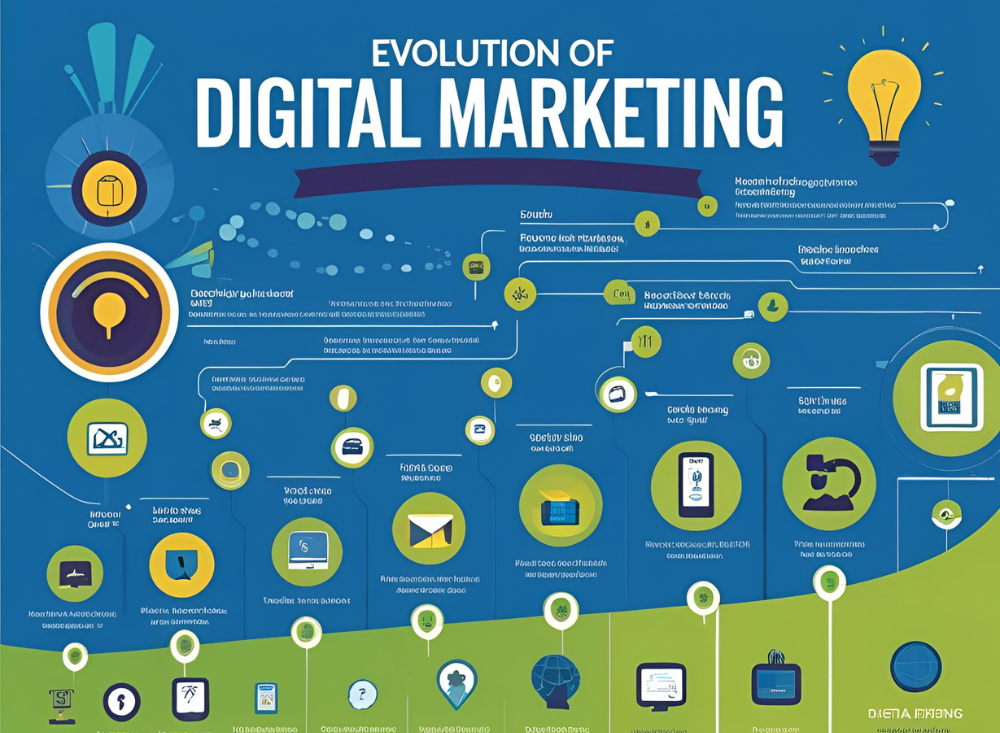
Digital marketing has transformed dramatically over the past few decades, evolving from simple banner ads to sophisticated, data-driven campaigns powered by artificial intelligence (AI). This journey reflects the rapid advancement of technology and changing consumer behaviors, with businesses adapting to stay competitive in an increasingly digital world. In this blog, we’ll explore the key milestones in digital marketing’s evolution and highlight how innovative platforms like Salio.ai are shaping its future.
The Early Days: Static Ads and Email Campaigns
In the 1990s, digital marketing was in its infancy. The first clickable banner ad appeared in 1994, marking the birth of online advertising. Early efforts focused on static web ads and basic email marketing, with limited targeting capabilities. Marketers relied on broad demographics and manual processes, often resulting in low engagement rates. The internet was a new frontier, and businesses were just beginning to understand its potential.
The Rise of Search and Social Media
The early 2000s brought significant advancements with the rise of search engine optimization (SEO) and pay-per-click (PPC) advertising. Google’s AdWords (now Google Ads), launched in 2000, allowed businesses to target users based on search queries, revolutionizing ad precision. The emergence of social media platforms like Facebook (2004) and Twitter (2006) further transformed the landscape, enabling brands to engage directly with audiences through organic and paid content. Analytics tools, such as Google Analytics, introduced data-driven insights, helping marketers measure campaign performance and refine strategies.
The Big Data and Personalization Era
By the 2010s, the explosion of big data and advancements in machine learning reshaped digital marketing. Marketers could now collect and analyze vast amounts of consumer data, enabling hyper-personalized campaigns. Platforms like Amazon and Netflix set the standard for personalization, using algorithms to recommend products and content based on user behavior. Email marketing evolved with automated workflows, and programmatic advertising streamlined ad placements, improving efficiency and ROI. According to a McKinsey survey, AI-powered digital marketing tactics accelerated consumer and business adoption by five years, highlighting the transformative impact of data-driven strategies.
AI Takes Center Stage
Today, artificial intelligence is the driving force behind digital marketing’s evolution. AI tools analyze consumer behavior, predict trends, and automate repetitive tasks, allowing marketers to focus on strategy and creativity. Chatbots, powered by natural language processing (NLP), provide 24/7 customer support, while predictive analytics optimize campaign timing and targeting. Generative AI, like that used by platforms such as Salio.ai, is revolutionizing content creation. Salio.ai leverages advanced AI to generate SEO-optimized content, craft personalized ad copy, and analyze campaign performance in real time, empowering businesses to create impactful marketing strategies with minimal effort. A 2023 Statista report noted that 94% of UK senior marketers used AI in digital advertising, underscoring its widespread adoption.
The Role of Salio.ai in Modern Marketing
Salio.ai stands out as a game-changer in the AI-driven marketing landscape. By combining machine learning and NLP, Salio.ai enables marketers to create high-quality, tailored content at scale, from blog posts to social media updates. Its predictive analytics tools help businesses anticipate customer needs, while its automation features streamline campaign management. For example, Salio.ai’s platform can analyze competitor campaigns and user preferences to deliver hyper-targeted ads, boosting engagement and conversions. This aligns with industry trends, as 61% of marketers cite AI as a key component of their data strategy.
The Future: Agentic AI and Ethical Challenges
Looking ahead, the rise of agentic AI—autonomous systems that research, evaluate, and recommend on behalf of consumers—will redefine digital marketing. Platforms like Salio.ai are well-positioned to adapt, offering tools to optimize content for AI agents, ensuring brands remain visible in a machine-driven ecosystem. However, ethical concerns, such as data privacy and algorithmic bias, remain critical. Businesses must balance AI’s capabilities with transparent, responsible practices to maintain consumer trust. As noted in a 2023 analysis, ethical AI implementation is essential for sustainable growth in digital marketing.
Conclusion
The evolution of digital marketing reflects the power of technology to transform how brands connect with audiences. From static ads to AI-driven personalization, the industry has come a long way. Platforms like Salio.ai are at the forefront, empowering marketers with tools to create, analyze, and optimize campaigns with unprecedented efficiency. As AI continues to shape the future, embracing innovative solutions while prioritizing ethics will be key to staying competitive in this dynamic landscape.